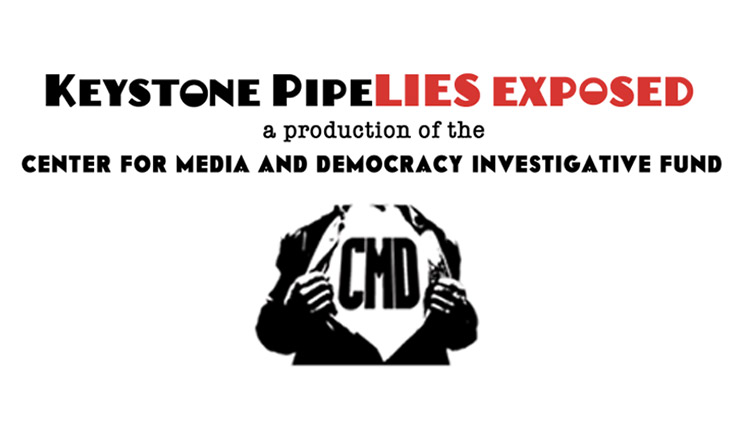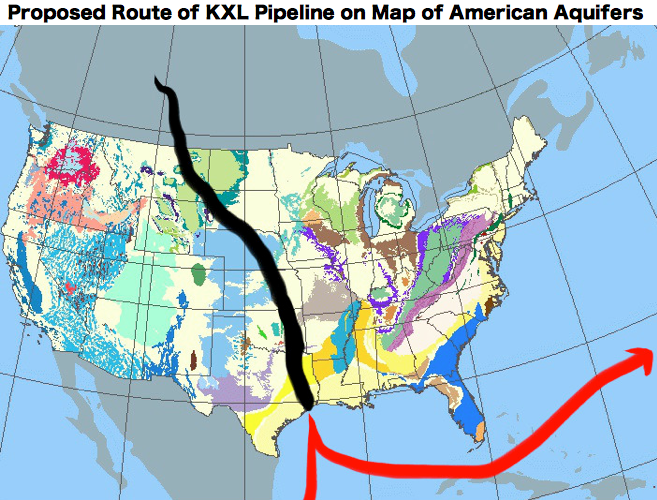Submitted by PRWatch Editors on
-- by Dave Saldana, Director, Writer, and Producer of "Keystone PipeLIES Exposed," a new short film that is a production of the Center for Media and Democracy Investigative Fund
 It's difficult to name an issue that is more fundamental to humankind than a functional global environment. In American society, it would be even more difficult to find agreement on what can and must be done to ensure that our actions do not render our global ecosystem uninhabitable.
It's difficult to name an issue that is more fundamental to humankind than a functional global environment. In American society, it would be even more difficult to find agreement on what can and must be done to ensure that our actions do not render our global ecosystem uninhabitable.
First, it would be near impossible to reach consensus on the central premise, that human action impacts the environment and could eventually damage it to the extent that society as we understand it could not function.
The vast and overwhelming weight of scientific research is virtually unanimously concludes that humans' burning fossil fuels in ever-increasing quantities over the past two centuries caused Earth's temperature to rise, and continuing to do so could yield devastating results. The research comes from a variety of fields, including climatology, economics, and national security, and from sources with unimpeachable credentials and reliability.
And yet, there remains a stubborn and defiant cabal of Americans who refuse to believe that the phenomenon is real. Though the warnings on climate change have been increasingly troubling and urgent, the so-called "climate deniers" -- including many elected officials -- shrug them off, or more derisively spurn them as part of an elaborate hoax.
Complicating the matter are the twin offspring of our current economic crisis -- the quest for jobs, and the need for low-cost energy. A promised solution to both of these comes in the form of newly economically feasible, unconventional fuels. From natural gas and shale oil made accessible through hydraulic fracturing, or "fracking," to petroleum rich but difficult-to-process tar sands, the fuel production industry promises that exploiting those resources will produce cheap energy and bountiful of jobs.
However, to make immense petroleum reserves buried beneath Canada's boreal forest economically viable, they must have access to the refineries and global markets that yield the highest profits.
Enter, the Keystone XL pipeline.
 The proposed pipeline would connect tar sands extraction facilities in northern Alberta to refineries on the Gulf Coast of Texas, from which it can be exported to the international market. Its proposed route traverses the central United States, through the Plains states on its way to Port Arthur, Texas, the home to some of the world's largest refineries.
The proposed pipeline would connect tar sands extraction facilities in northern Alberta to refineries on the Gulf Coast of Texas, from which it can be exported to the international market. Its proposed route traverses the central United States, through the Plains states on its way to Port Arthur, Texas, the home to some of the world's largest refineries.
TransCanada, the Canadian corporation behind the project, promises that the pipeline will create thousands of U.S. jobs, provide U.S. households with a reliable source of low-cost fuel, and will lessen U.S. reliance on oil from the Middle East.
Those who oppose the pipeline and tar sands exploitation believe TransCanada's promises are a tissue of lies. They say it will create precious few jobs, exacerbate climate change, endanger vital natural resources in the American heartland, and spread toxins in already disadvantaged communities. They call it an "all risk, no reward" proposition for the American people.
The mainstream news media have fallen into the comfortable, formulaic he-said-she-said coverage that may seem balanced, it does little to explain the competing interests in such a highly complicated matter.
This report and short film, "Keystone PipeLIES Exposed," seeks to fill the gap left by analysis-free media coverage of the Keystone XL pipeline controversy. Obviously, we can neither prove nor disprove the claims made by TransCanada and its opponents; neither the corporation's lofty promises nor the opposition's ominous warnings could be tested unless the pipeline is built. Which, of course, would render the debate moot.
We can, however, look to the past.
Keystone XL would not be the first pipeline to move tar sands petroleum across the United States, so there is real-life evidence of what happens when tar sands product is piped through communities. There is also substantiation for the argument that alternative energy resources would be a greater economic boon to the United States, creating jobs and providing genuine energy independence.
The decision to approve or reject the Keystone XL pipeline project is presently in President Barack Obama's hands. He has expressed doubt about the project's benefits and some concern about its potential impacts on the environment. This has many Keystone opponents feeling optimistic.
But the political process is fraught with intrigue that frequently comes in the form of millions of dollars, of whichTransCanada and its allies in the American Petroleum Institute have many more than their adversaries do. We will also investigate how the public debate has been shaped to this point, and how grassroots activism has impacted the political process.
We must also make this point very clear: we have an opinion and an objective in producing this report and our film.
Our opinion is based upon our research and the evidence we encountered, which compels us to conclude that the Keystone XL pipeline project is a bad idea. The evidence, which will be laid out in the sections to follow, dictates that projections of job creation are grossly inflated; that alternatives would provide greater benefits to the American economy and national energy security; and that risks to the environment, both globally and locally, overwhelmingly militate for Keystone's rejection.
Our objective is to present the evidence accurately, to that end that you also will conclude, and tell President Obama, that Keystone XL is not in the best interests of the United States of America.
Tell the State Department what you think about Keystone XL by taking action here.

